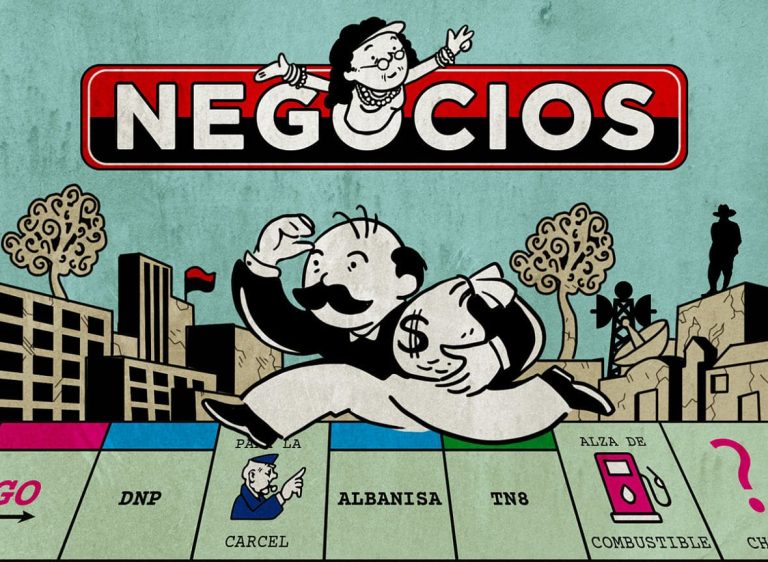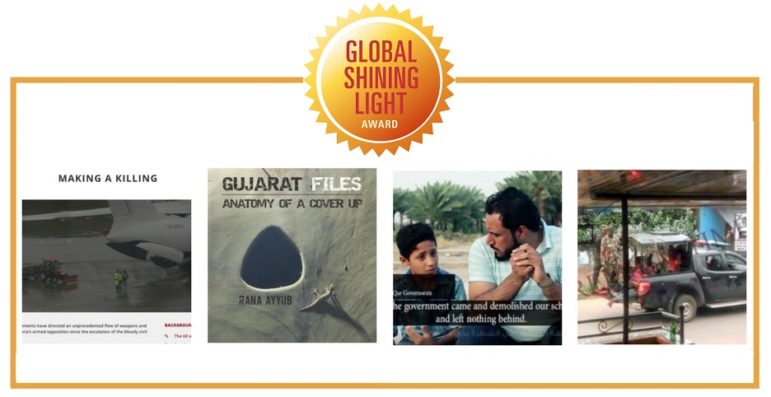

Investigative Stories from Iraq, Nigeria Win Global Shining Light Award
Read this article in
Russian version is here. – Русская версия здесь.
Winners of the seventh Global Shining Light Awards were announced at the Global Investigative Journalism Conference tonight in Johannesburg, South Africa. Top prizes went to gutsy investigations of missing funds in Iraq and extra-judicial killings in Nigeria, with citations of excellence to exposes of arms trafficking in Eastern Europe and complicity behind anti-Muslim riots in India.
 Winners of the seventh Global Shining Light Award were announced at the Global Investigative Journalism Conference tonight in Johannesburg, South Africa. The prize honors investigative journalism conducted in a developing or transitioning country, done under threat, duress, or in the direst of conditions.
Winners of the seventh Global Shining Light Award were announced at the Global Investigative Journalism Conference tonight in Johannesburg, South Africa. The prize honors investigative journalism conducted in a developing or transitioning country, done under threat, duress, or in the direst of conditions.
The award drew a record 211 submissions from 67 countries, more than double the number of entries in the previous GSL Award in 2015. The award this year is for stories published or broadcast between January 1, 2015 and December 31, 2016.
Two investigations were awarded first place: “Inside the Massive Extrajudicial Killings in Nigeria’s South-East” and “How the Onitsha Massacre of Pro-Biafra Supporters was Coordinated,” on extrajudicial killings of a minority ethnic group in Nigeria, by Premium Times; and “Project No. 1,” by Beladi TV channel, on corruption in Iraq’s Ministry of Education.
In addition, the judges honoured two other projects with citations of excellence: “Making a Killing,” for the joint investigation that exposed an arms pipeline between Central and Eastern Europe and the Middle East worth €1.2 billion; and “Gujarat Files: Anatomy of a Coverup,”, for an undercover investigation revealing India’s top officials’ complicity in the 2002 Gujarat Riots.
“The judges were particularly impressed with the solo investigations that were conducted with minimal resources amid real threats and intimidation,” noted Sheila Coronel, Academic Affairs Dean of the Columbia University Graduate School of Journalism, one of the judges. “By honoring the extraordinary work of these journalists at risk, we pay tribute to all the good work being done in so many places where courageous journalists keep the flame of watchdog reporting alive.”
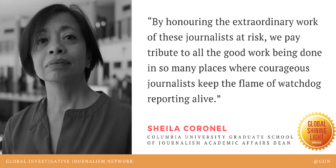 “The competition this year was extraordinary,” notes David E. Kaplan, executive director of the Global Investigative Journalism Network, which sponsors the awards. “Despite the global backlash against quality journalism, this shows that investigative reporting is alive and well around the world.”
“The competition this year was extraordinary,” notes David E. Kaplan, executive director of the Global Investigative Journalism Network, which sponsors the awards. “Despite the global backlash against quality journalism, this shows that investigative reporting is alive and well around the world.”
The winners were chosen from a dozen finalists from 11 countries, and included exposing false claims of a corruption crackdown in Serbia, gold smuggling in Peru, land theft in Brazil, judicial bribery in Ghana, financial manipulation in China, vigilante killings in India, military conscript murders in Egypt, and corruption among Azerbaijan’s ruling family.
An international panel of judges selected this year’s winners and found the competition extraordinary.
The Winners Are:
Winner (Joint)
“Inside the Massive Extrajudicial Killings in Nigeria’s South-East” and “How the Onitsha Massacre of Pro-Biafra Supporters was Coordinated,” Premium Times, Nigeria (2016). Reporter: Emmanuel Mayah; Editor: Musikilu Mojeed
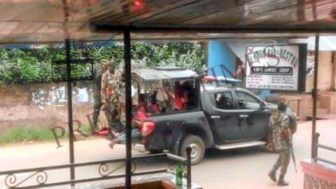 A two-month long investigation by Mayah uncovered multiple mass graves, lending support to allegations that police and military forces have been targeting a minority ethnic group for abuse and extrajudicial killings. Following reports that included photo evidence, human rights groups called for an independent probe and the army announced another investigation.
A two-month long investigation by Mayah uncovered multiple mass graves, lending support to allegations that police and military forces have been targeting a minority ethnic group for abuse and extrajudicial killings. Following reports that included photo evidence, human rights groups called for an independent probe and the army announced another investigation.
Winner (Joint)
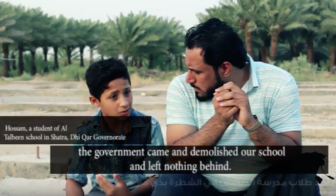 “Project No. 1,”Beladi TV channel, Iraq (2016), Investigation: Asaad Al-Zalzali; Photography: Thaer Khalid
“Project No. 1,”Beladi TV channel, Iraq (2016), Investigation: Asaad Al-Zalzali; Photography: Thaer Khalid
When $200 million allocated for public schools in Iraq went missing, reporter Al-Zalzali followed the money, which led him to a bank and to another country. The story exposed the magnitude of corruption in the country’s Ministry of Education and led to a conviction and a settlement that returned half the stolen money.
Citation of Excellence
“Making a Killing,” Balkan Investigative Reporting Network and the Organized Crime and Corruption Reporting Project (2016) Reporters: Lawrence Marzouk, Ivan Angelovski and Miranda Patrucic; Additional reporting: Atanas Tchobanov, Dusica Tomovic, Jelena Cosic, Jelena Svircic, Lindita Cela, RISE Moldova, Pavla Holcova, Stevan Dojcinovic and Pavle Petrovic; Editors: Drew Sullivan, Jody McPhillips, Rosemary Armao, Gordana Igric and Anita Rice
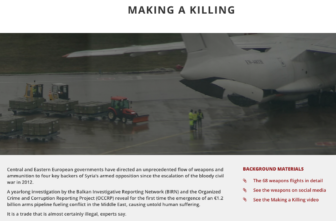 The joint investigation uncovered an arms pipeline between Central and Eastern Europe and the Middle East worth €1.2 billion. The weapons flow, reporters found, were being financed by Saudi Arabia, Jordan, the UAE and Turkey, and systematically diverted to extremist groups, including the Islamic State.
The joint investigation uncovered an arms pipeline between Central and Eastern Europe and the Middle East worth €1.2 billion. The weapons flow, reporters found, were being financed by Saudi Arabia, Jordan, the UAE and Turkey, and systematically diverted to extremist groups, including the Islamic State.
After the story was published, the European Union announced it would monitor the flow of weapons and several countries reviewed their policies.
Citation of Excellence
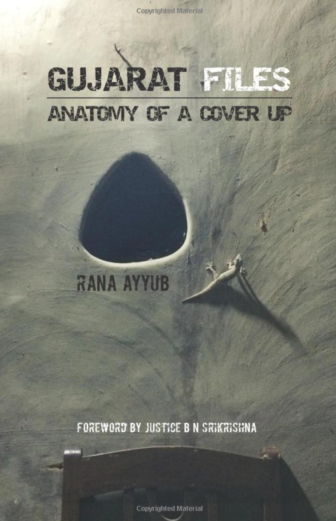 “Gujarat Files: Anatomy of a Coverup,” self-published,India (2016). Rana Ayyub
“Gujarat Files: Anatomy of a Coverup,” self-published,India (2016). Rana Ayyub
Reporter Rana Ayyub went undercover for nine months to record top officials speaking candidly about the 2002 riots in Gujarat, which left at least 1000 Muslims dead. When one of the targets of Ayyub’s investigation was poised to become the country’s new prime minister, Indian media houses got cold feet. Despite threats and surveillance, Ayyub self-published the transcripts that revealed complicity by India’s top officials in the attacks.
The Global Shining Light Award is sponsored by the Global Investigative Journalism Network, an association of 155 nonprofit groups in 68 countries that work to support and spread investigative reporting. Founded in 2003, GIJN helps organize regional and international conferences and workshops, assists in the formation and sustainability of organizations dedicated to investigative and data journalism, and provides resources and networking services for investigative journalists worldwide.
For more information contact: secretariat@gijn.org.





